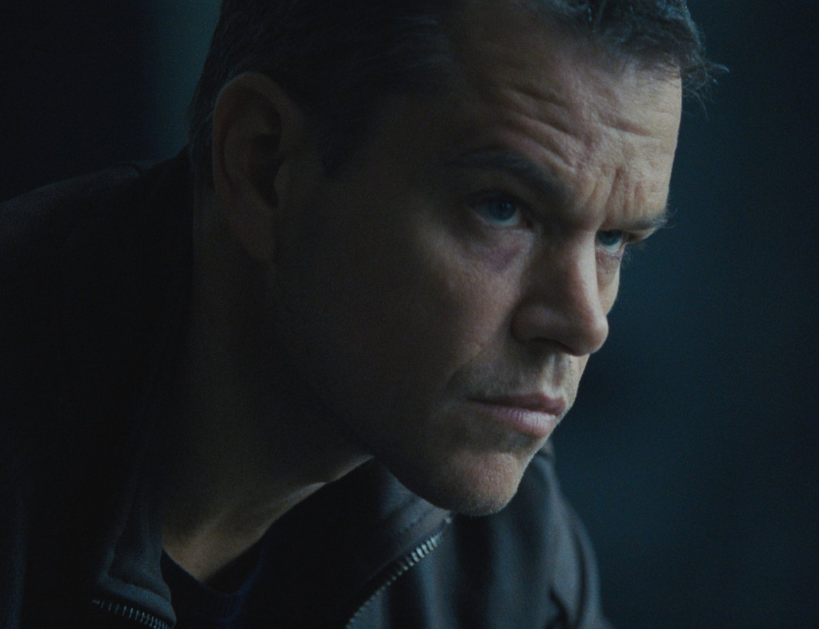Like its predecessors, Jason Bourne has all the makings of a blockbuster movie. Tommy Lee Jones and Alicia Vikander, fresh off her Oscar for The Danish Girl, give phenomenal performances. Director of the original trilogy Paul Greengrass returns to his chair for this newest undertaking, organizing intense action scenes and suspenseful moments in a film that overall is plagued by questionable plot points and missed opportunities.
The film opens with CIA officials reacting to a breach in their security systems – someone has illegally downloaded operations files with unclear intentions. CIA agent Heather Lee (Vikander) determines the cause of the breach and initiates a cross-nation manhunt for the culprit(s). This early sequence allows Lee to build rapport with the CIA director and positions her as the director’s protege. From here, she makes decisions to achieve her own selfish motives and dictate the actions of many CIA authorities, especially in regard to Bourne. When Bourne finally appears, inexplicably, in Athens, the bulk of the story follows his interactions with various CIA employees, directed by Lee and centered around both the organization’s set of secret missions and Bourne’s lingering confusion over his own past.
Surprisingly, super spy Bourne doesn’t drive the story of Jason Bourne – he maintains a very reactive role throughout the film, and his character development is stunted overall. The earliest inciting moment – the exposure of top-secret CIA mission files – has nothing to do with Bourne. Ancillary characters often dictate specific scenes, but even these individuals fail to develop in Bourne: at a major plot point Bourne meets a seemingly deep and nefarious character, who then lacks any further significance in the film. Unfortunately, Bourne’s role remains nearly as stunted as those of the peripheral characters. The first 30 minutes serve as an exaggerated way to remind the CIA that Bourne exists. The rest of the time Bourne is just running around following people who don’t really care about him – Bourne possesses little importance in regard to the plot at large. And despite these chases, the cinematography here pales in comparison to that of the originals: there’s nothing like the camera tracking Bourne as he jumps through two windows.
While the title character often takes a backseat in plot movement, the heavy-handed surveillance and “Internet is watching” argument underlies much of the film – a theme that is conspicuous throughout. The film could have investigated the argument over where to draw the line with privacy, but instead focused on the black-and-white non-controversy of whether everyone should have some privacy, a relatively safe, and therefore far less interesting choice.
Despite the interesting involvement of the often unaddressed “CIA Venture Capital” wing, which has invested heavily in a major social network, Bourne’s involvement with the organization remains ambiguous as the portrayal of the Venture Capital wing vacillates shallowly between positive and negative. After an hour of playing cat – and sometimes mouse – in the CIA’s Lee-orchestrated game, Bourne makes his first independent decision in the moments leading up to a giant tech conference at a panel co-hosted by the CIA Venture Capital wing: it is here Bourne attempts to complete his vendetta against his former employer. The cause is unclear: is it fueled by the mystery surrounding his father, whose CIA profile we see early in the film? Is it the result of pent-up rage after his previous near-incidents with the CIA after his departure from the organization? Is it motivated by a deep belief that the CIA’s ongoing actions are inappropriate and illegal? The movie fails to effectively elucidate Bourne’s motivations in turning against the CIA, undermining much of his actions.
Moreover, Jason Bourne is not a sympathetic character: his dialogue is limited, his motivations unclear, his alliances shifting, his emotions and responses confusing and misled. Because Bourne’s justifications are so veiled, his morals are thrown into question, leaving unclear who is “right” and who is “wrong.” In the original trilogy we learn with Bourne that he was an assassin for the CIA. The most redeeming aspect of this was that he resented his past and was really running away from the people that were after him. In Jason Bourne he now has an uncharacteristic desire to go after them.
Looking past superficial plotlines and poorly developed characters, many aspects of the film were strong and engaging. The film features numerous settings both visually appealing and culturally relevant – especially the panoramic views of the National Mall. The viewer follows Bourne and former agent Nicky Parsons, played by Julia Stiles, reprising her role from the original trilogy, on an exhilarating motorcycle chase through the alleys of Greece. The internal dynamics of the CIA and its staff are similar to those in the series’ first three films: people are still self-seeking, career-driven, and mistrusting. It successfully utilizes old plot points to motivate current actions while providing sufficient context for the novice viewer to follow along.
Overall, Jason Bourne adheres to the action film archetype and stays somewhat loyal to the original trilogy without repeating plot points, but fails to fully develop its lead character, who unemotionally achieves a murky and lukewarm “victory” in one of the closing scenes. The confusion surrounding Bourne and his (limited) actions makes it difficult to become engrossed in the film. Unless you are a die-hard Bourne fan, this is one worth waiting to catch on FX.





